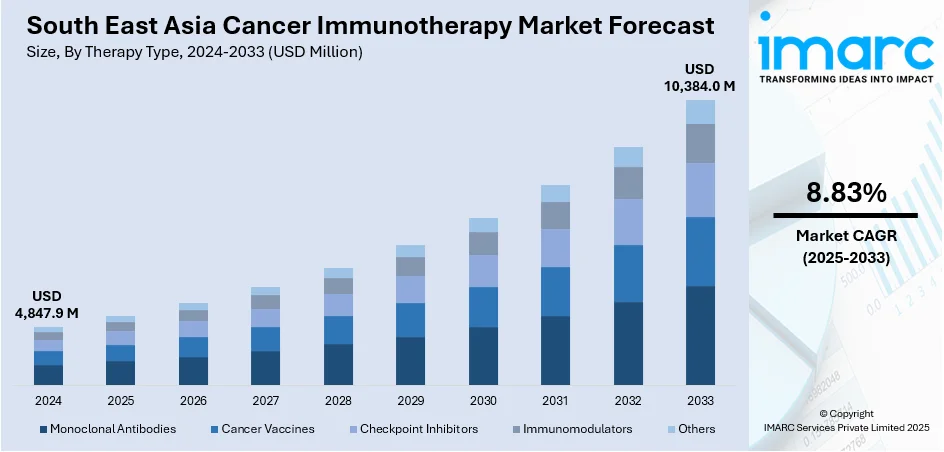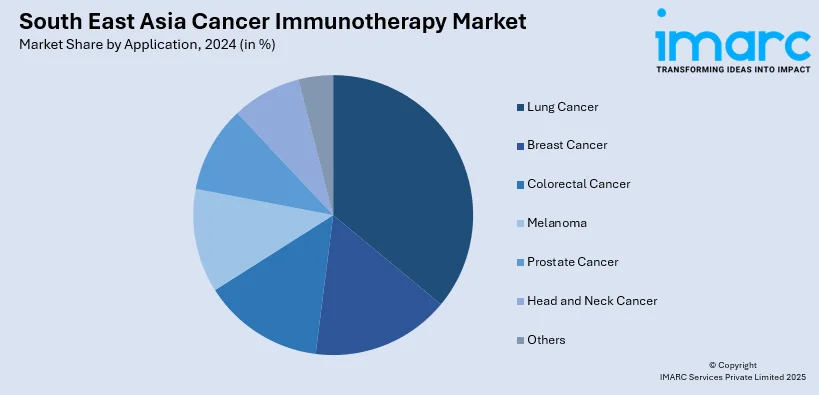
South East Asia Cancer Immunotherapy Market Report by Therapy Type (Monoclonal Antibodies, Cancer Vaccines, Checkpoint Inhibitors, Immunomodulators, and Others), Application (Lung Cancer, Breast Cancer, Colorectal Cancer, Melanoma, Prostate Cancer, Head and Neck Cancer, and Others), End User (Hospitals, Cancer Research Centers, Clinics, and Others), and Country 2025-2033
Market Overview:
South East Asia cancer immunotherapy market size reached USD 4,847.9 Million in 2024. Looking forward, IMARC Group expects the market to reach USD 10,384.0 Million by 2033, exhibiting a growth rate (CAGR) of 8.83% during 2025-2033. The growing demand for more effective and innovative cancer treatments, increasing prevalence of cancer among the masses, and rising collaborations between pharmaceutical companies, research institutions, and healthcare providers represent some of the key factors driving the market.
|
Report Attribute
|
Key Statistics
|
|---|---|
|
Base Year
|
2024
|
|
Forecast Years
|
2025-2033
|
|
Historical Years
|
2019-2024
|
|
Market Size in 2024
|
USD 4,847.9 Million |
|
Market Forecast in 2033
|
USD 10,384.0 Million |
| Market Growth Rate 2025-2033 | 8.83% |
Cancer immunotherapy, also known as immune oncology, is an approach for treating cancer that harnesses the immune system of the body to combat malignant cells. It can precisely target cancer cells while sparing healthy ones unlike traditional treatments, such as chemotherapy, which can have indiscriminate effects on the body. It often leads to durable responses as the immune system retains memory of the cancer cells and can mount a defense if they reappear. It possesses lesser side effects as compared to traditional cancer treatments, which can cause severe side effects, including nausea, hair loss, and immune suppression. It enhances the overall quality of life of patients during and after treatment, as they can maintain their daily routines and experience fewer disruptions. It assists healthcare professionals in treating various types of cancer, including melanoma, lung cancer, and certain types of leukemia. It can be combined with other treatments like chemotherapy or targeted therapy to create a synergistic effect, potentially increasing the chances of tumor shrinkage and improved outcomes. As it can be tailored as per the specific genetic makeup and tumor characteristics of patients, making it highly suitable for personalized medicine in cancer treatment, the demand for cancer immunotherapy is rising in the South East Asia region.

To get more information on this market, Request Sample
South East Asia Cancer Immunotherapy Market Trends:
At present, the increasing prevalence of cancer among the masses due to the aging demographics and lifestyle changes represents one of the key factors supporting the growth of the market in the South East Asia region. Besides this, ongoing research and development (R&D) activities in the field of cancer immunotherapy are leading to the discovery of novel treatments and therapeutic targets. This progress is generating accurate ways to treat cancer, driving the adoption of immunotherapy as a viable treatment option among healthcare providers and patients in the region. In addition, governing agencies in the South East Asia region are recognizing the importance of cancer immunotherapy in improving healthcare outcomes. Initiatives, such as funding for research, streamlined regulatory processes, and public awareness campaigns are strengthening the growth of the market. Moreover, investments in healthcare infrastructure and facilities are rising in the region. This includes the expansion of cancer care centers and the integration of immunotherapy into the standard treatment. The growing demand for improving healthcare access is driving the adoption of advanced therapies like immunotherapy in the South East Asia region. Additionally, collaborations between pharmaceutical companies, research institutions, and healthcare providers are accelerating the development and commercialization of immunotherapeutic agents. These partnerships are fostering innovation and ensuring that cutting-edge treatments reach patients in the South East Asia region.
South East Asia Cancer Immunotherapy Market Segmentation:
IMARC Group provides an analysis of the key trends in each segment of the market, along with forecasts at the regional and country levels for 2025-2033. Our report has categorized the market based on therapy type, application, and end user.
Therapy Type Insights:
- Monoclonal Antibodies
- Cancer Vaccines
- Checkpoint Inhibitors
- Immunomodulators
- Others
The report has provided a detailed breakup and analysis of the market based on the therapy type. This includes monoclonal antibodies, cancer vaccines, checkpoint inhibitors, immunomodulators, and others.
Application Insights:

- Lung Cancer
- Breast Cancer
- Colorectal Cancer
- Melanoma
- Prostate Cancer
- Head and Neck Cancer
- Others
A detailed breakup and analysis of the market based on the application have also been provided in the report. This includes lung cancer, breast cancer, colorectal cancer, melanoma, prostate cancer, head and neck cancer, and others.
End User Insights:
- Hospitals
- Cancer Research Centers
- Clinics
- Others
The report has provided a detailed breakup and analysis of the market based on the end user. This includes hospitals, cancer research centers, clinics, and others.
Country Insights:
- Indonesia
- Thailand
- Singapore
- Philippines
- Vietnam
- Malaysia
- Others
The report has also provided a comprehensive analysis of all the major regional markets, which include Indonesia, Thailand, Singapore, Philippines, Vietnam, Malaysia, and Others.
Competitive Landscape:
The market research report has also provided a comprehensive analysis of the competitive landscape in the market. Competitive analysis such as market structure, key player positioning, top winning strategies, competitive dashboard, and company evaluation quadrant has been covered in the report. Also, detailed profiles of all major companies have been provided.
South East Asia Cancer Immunotherapy Market Report Coverage:
| Report Features | Details |
|---|---|
| Base Year of the Analysis | 2024 |
| Historical Period | 2019-2024 |
| Forecast Period | 2025-2033 |
| Units | Million USD |
| Scope of the Report | Exploration of Historical and Forecast Trends, Industry Catalysts and Challenges, Segment-Wise Historical and Predictive Market Assessment:
|
| Therapy Types Covered | Monoclonal Antibodies, Cancer Vaccines, Checkpoint Inhibitors, Immunomodulators, Others |
| Applications Covered | Lung Cancer, Breast Cancer, Colorectal Cancer, Melanoma, Prostate Cancer, Head and Neck Cancer, Others |
| End Users Covered | Hospitals, Cancer Research Centers, Clinics, Others |
| Countries Covered | Indonesia, Thailand, Singapore, Philippines, Vietnam, Malaysia, Others |
| Customization Scope | 10% Free Customization |
| Post-Sale Analyst Support | 10-12 Weeks |
| Delivery Format | PDF and Excel through Email (We can also provide the editable version of the report in PPT/Word format on special request) |
Key Questions Answered in This Report:
- How has the South East Asia cancer immunotherapy market performed so far and how will it perform in the coming years?
- What has been the impact of COVID-19 on the South East Asia cancer immunotherapy market?
- What is the breakup of the South East Asia cancer immunotherapy market on the basis of therapy type?
- What is the breakup of the South East Asia cancer immunotherapy market on the basis of application?
- What is the breakup of the South East Asia cancer immunotherapy market on the basis of end user?
- What are the various stages in the value chain of the South East Asia cancer immunotherapy market?
- What are the key driving factors and challenges in the South East Asia cancer immunotherapy?
- What is the structure of the South East Asia cancer immunotherapy market and who are the key players?
- What is the degree of competition in the South East Asia cancer immunotherapy market?
Key Benefits for Stakeholders:
- IMARC’s industry report offers a comprehensive quantitative analysis of various market segments, historical and current market trends, market forecasts, and dynamics of the South East Asia cancer immunotherapy market from 2019-2033.
- The research report provides the latest information on the market drivers, challenges, and opportunities in the South East Asia cancer immunotherapy market.
- Porter's five forces analysis assist stakeholders in assessing the impact of new entrants, competitive rivalry, supplier power, buyer power, and the threat of substitution. It helps stakeholders to analyze the level of competition within the South East Asia cancer immunotherapy industry and its attractiveness.
- Competitive landscape allows stakeholders to understand their competitive environment and provides an insight into the current positions of key players in the market.
Need more help?
- Speak to our experienced analysts for insights on the current market scenarios.
- Include additional segments and countries to customize the report as per your requirement.
- Gain an unparalleled competitive advantage in your domain by understanding how to utilize the report and positively impacting your operations and revenue.
- For further assistance, please connect with our analysts.
 Request Customization
Request Customization
 Speak to an Analyst
Speak to an Analyst
 Request Brochure
Request Brochure
 Inquire Before Buying
Inquire Before Buying




.webp)




.webp)












